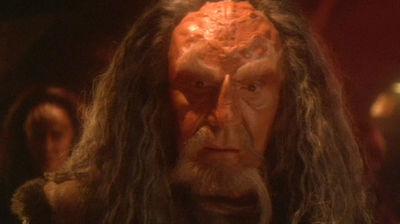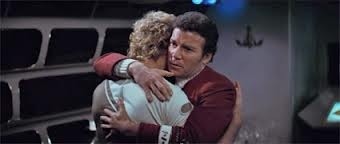A friend of mine from the school I used to work at posted the meme/photo above several weeks ago and added underneath it:
“Fight me.” -- n.l.n.
As a long-time fan of all of the series, I had to serious consider her argument. The following is my train of thought (edited, boiled down then expanded with references into a coherent essay that will likely irritate as many people as it lifts up!) Onward then!
Captain, father, diplomat, religious figure?
As a long-time fan of all of the series, I had to serious consider her argument. The following is my train of thought (edited, boiled down then expanded with references into a coherent essay that will likely irritate as many people as it lifts up!) Onward then!
Captain, father, diplomat, religious figure?
For three seasons, he held the rank of Captain, and was then promoted to Commander for the last three. In my humble opinion, he blew Kirk (old and new), Picard, Janeway, Archer, and Lorca out of the water -- PLUS, he didn't have a starship to flash around, just a dumpy old space station that broke down every other episode.
Picard was given the top-tech FLAGSHIP of the Federation. Kirk captained the first starship to actually go on an exploratory mission. Lorca’s job was to save the Federation from a devastating war with the Klingon Empire. Archer took the very first starship and led the very first mission out of Human space under the watchful eye of the Vulcans, who stood ready to mop up any mess Archer got into. Janeway, with an amazing ship had to rip disaster out of the mouth of diplomacy as practiced by the Federation and the Cardassian Empire.
Sisko got a ruined space station, intentionally sacked by the departing Cardassian former owners, a deeply suspicious population below who wanted nothing more than to get rid of all these frickin’ aliens and go back to Life As We Knew It…
Oh, and his “liaison” with the Bajoran Transitional Government was one of their most celebrated…terrorists…who saw the Federation as just another version of the Cardassians.
“Here you go, Sisko. Let’s see what you can do with this, hehehehehehe…”
Woops, I forgot: along with an actively hostile civilian government on the world below; and actively hostile military government a few moments away by starship (which neither he nor the Barjoans have access to); there’s also a clandestine observation by an actively hostile alien alien who can detach bits of itself that can take the shape of ANYTHING in order to spy on you.
Jake Sisco’s best FRIEND was altered by his relationship with both Siskos that he chose to become the first Ferengi to enlist in Starfleet Officer (and he eventually became a captain) which of course, ended up ameliorating the ”money-grubbing” nature of the Ferengi so much so that Rom, Quark’s brother became the new Grand Nagus.
Oh, another thing, Sisko was the ONLY one of the set who dared to take the REALLY daring voyage of marriage and family life. Added layer: he was very recently widowed and his son was shocked by the loss of his mother so, just staple "bereaved" on to the other minor things he was dealing with...(Kirk tried the marriage and kid thing VERY briefly and admittedly failed except for the making-a-kid-part (apparently accepting fatherhood for an undisclosed amount of time, then ditching THAT SUCKER like an irritated Orion Slave Girl (though it’s the MEN who are slaves to the women, apparently)).
In addition to the above, his son chose to be a writer while his son’s best FRIEND became a Starfleet Officer (eventually captain) which of course, ended up ameliorating the ”money-grubbing” nature of the Ferengi so much so that Rom, Quark’s brother became the new Grand Nagus; as a religious icon called the Emissary of the Prophets and completely fulfilled the Prophecy by sacrificing his Humanity to them.
When confronted with the clandestine observation by an actively hostile alien alien called The Great Link whose stated intent was to destroy all Solids; and who detached bits of itself, one of which ended up on DS9 calling itself Odo and was able to take the shape of ANYTHING in order to spy on Humans aboard DS9 and became so loyal to them that he very nearly refused to halt a plague given to The Great Link because he’d fallen in love with a Solid. His respect and love for Nerice and Sisko made him reenter The Great Link with the cure for the plague and saved ALL of them, bringing about the end of the Dominion, the downfall of the Cardassian Empire (again), and the integration of a bit of Starfleet into the Prophets of the Wormhole.
Let’s just tote this up. Sisko: saved Bajor, reformed Bajoran terrorist, altered Ferengi social fabric, became religious icon then fulfilled sundry prophecies including Final Prophecy of entire Bajoran civilization, reformed and saved communal alien life form, earned respect of Cardassian Empire, all WITHOUT A STARSHIP and using a dilapidated, booby-trapped, former prison of a space station as a base.
So tell me again, EXACTLY what did Kirk, Picard, Janeway, Archer, and Lorca do for Life, the Universe, and Everything?
Last of all, from a Reality Standpoint, Sisco has been relegated to being an unsung hero of the Federation. Why doesn’t he receive more accolades? How MANY real biases did he topple? At the very least, two. He was the ANTI-absent black father. He was the ANTI-uneducated black male. Despite all of this, not only was Sisko, or more correctly, Avery Brooks pretty much forgotten, he should have in fact, been a major hero in the STAR TREK canon.
But he’s not. People rave all the time about Kirk or Picard. Not ONLY did Sisko/Brooks end up being a fictional INVISIBLE MAN he actually tried to bring this up in the infrequently mentioned DS9 episode, “Far Beyond the Stars”.
Brooks commented, “If we had changed the people's clothes, this story could be about right now. What's insidious about racism is that it is unconscious. Even among these very bright and enlightened characters – a group that includes a woman writer who has to use a man's name to get her work published, and who is married to a brown man with a British accent in 1953 – it's perfectly reasonable to coexist with someone like Pabst. It’s in the culture, it’s the way people think. So that was the approach we took. I never talked about racism. I just showed how these intelligent people think, and it all came out of them.” However, it wasn’t supposed to be entirely about racism. Brooks added, “The people thought it was about racism, well maybe so, maybe not [….] But the fact of the matter in 'Far Beyond the Stars' is that you have a man who essentially was conceiving of something far beyond what people around him had ever imagined, and therefore they thought he was crazy.” This episode was Avery Brooks' personal favorite, “I'd have to say, it was the most important moment for me in the entire seven years…It should have been a two-parter.”
Rene Auberjonois commented, "Brilliant episode. One of the best of the whole series and Avery did a fabulous job of directing it." Michael Dorn said, "It was wonderfully shot." Penny Johnson commented, “This was beautifully handled and beautifully shot. But it still, in the heart, it got me.” J.G. Hertzler commented, “I thought it was one you could have built an entire series from. There was a scene toward the end where he falls apart with the camera right in front of his nose. It was just riveting.” The same scene was also extremely memorable for Nana Visitor. Armin Shimerman thought highly of how the installment serves as a reminder of prejudice, especially racism, the actor commenting, “That's what that episode does terrifically well…it’s perfect science fiction. I think it stretches the imagination of the viewer and breaks down the fourth wall to talk about the real heroes of any TV shows, which are the writers.”
...Benjamin Sisko and Black Panther should have had a face-to-face...*sigh*
Reference: https://memory-alpha.fandom.com/wiki/Far_Beyond_the_Stars_(episode)
Image: https://memegenerator.net/img/instances/78192652.jpg
Let’s just tote this up. Sisko: saved Bajor, reformed Bajoran terrorist, altered Ferengi social fabric, became religious icon then fulfilled sundry prophecies including Final Prophecy of entire Bajoran civilization, reformed and saved communal alien life form, earned respect of Cardassian Empire, all WITHOUT A STARSHIP and using a dilapidated, booby-trapped, former prison of a space station as a base.
So tell me again, EXACTLY what did Kirk, Picard, Janeway, Archer, and Lorca do for Life, the Universe, and Everything?
Last of all, from a Reality Standpoint, Sisco has been relegated to being an unsung hero of the Federation. Why doesn’t he receive more accolades? How MANY real biases did he topple? At the very least, two. He was the ANTI-absent black father. He was the ANTI-uneducated black male. Despite all of this, not only was Sisko, or more correctly, Avery Brooks pretty much forgotten, he should have in fact, been a major hero in the STAR TREK canon.
But he’s not. People rave all the time about Kirk or Picard. Not ONLY did Sisko/Brooks end up being a fictional INVISIBLE MAN he actually tried to bring this up in the infrequently mentioned DS9 episode, “Far Beyond the Stars”.
Brooks commented, “If we had changed the people's clothes, this story could be about right now. What's insidious about racism is that it is unconscious. Even among these very bright and enlightened characters – a group that includes a woman writer who has to use a man's name to get her work published, and who is married to a brown man with a British accent in 1953 – it's perfectly reasonable to coexist with someone like Pabst. It’s in the culture, it’s the way people think. So that was the approach we took. I never talked about racism. I just showed how these intelligent people think, and it all came out of them.” However, it wasn’t supposed to be entirely about racism. Brooks added, “The people thought it was about racism, well maybe so, maybe not [….] But the fact of the matter in 'Far Beyond the Stars' is that you have a man who essentially was conceiving of something far beyond what people around him had ever imagined, and therefore they thought he was crazy.” This episode was Avery Brooks' personal favorite, “I'd have to say, it was the most important moment for me in the entire seven years…It should have been a two-parter.”
Rene Auberjonois commented, "Brilliant episode. One of the best of the whole series and Avery did a fabulous job of directing it." Michael Dorn said, "It was wonderfully shot." Penny Johnson commented, “This was beautifully handled and beautifully shot. But it still, in the heart, it got me.” J.G. Hertzler commented, “I thought it was one you could have built an entire series from. There was a scene toward the end where he falls apart with the camera right in front of his nose. It was just riveting.” The same scene was also extremely memorable for Nana Visitor. Armin Shimerman thought highly of how the installment serves as a reminder of prejudice, especially racism, the actor commenting, “That's what that episode does terrifically well…it’s perfect science fiction. I think it stretches the imagination of the viewer and breaks down the fourth wall to talk about the real heroes of any TV shows, which are the writers.”
...Benjamin Sisko and Black Panther should have had a face-to-face...*sigh*
Reference: https://memory-alpha.fandom.com/wiki/Far_Beyond_the_Stars_(episode)
Image: https://memegenerator.net/img/instances/78192652.jpg







